Principles of English Writing
- 格式:pdf
- 大小:7.25 MB
- 文档页数:36
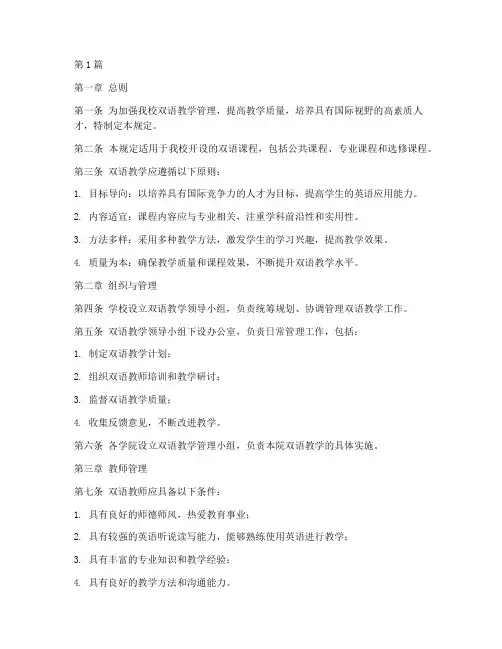
第1篇第一章总则第一条为加强我校双语教学管理,提高教学质量,培养具有国际视野的高素质人才,特制定本规定。
第二条本规定适用于我校开设的双语课程,包括公共课程、专业课程和选修课程。
第三条双语教学应遵循以下原则:1. 目标导向:以培养具有国际竞争力的人才为目标,提高学生的英语应用能力。
2. 内容适宜:课程内容应与专业相关,注重学科前沿性和实用性。
3. 方法多样:采用多种教学方法,激发学生的学习兴趣,提高教学效果。
4. 质量为本:确保教学质量和课程效果,不断提升双语教学水平。
第二章组织与管理第四条学校设立双语教学领导小组,负责统筹规划、协调管理双语教学工作。
第五条双语教学领导小组下设办公室,负责日常管理工作,包括:1. 制定双语教学计划;2. 组织双语教师培训和教学研讨;3. 监督双语教学质量;4. 收集反馈意见,不断改进教学。
第六条各学院设立双语教学管理小组,负责本院双语教学的具体实施。
第三章教师管理第七条双语教师应具备以下条件:1. 具有良好的师德师风,热爱教育事业;2. 具有较强的英语听说读写能力,能够熟练使用英语进行教学;3. 具有丰富的专业知识和教学经验;4. 具有良好的教学方法和沟通能力。
第八条学校对双语教师进行定期培训和考核,提高其教学水平和综合素质。
第九条双语教师应积极参加教学研讨和学术交流活动,不断提升自己的教学能力。
第四章课程设置与管理第十条双语课程设置应遵循以下原则:1. 符合专业培养目标和教学大纲要求;2. 具有较强的实用性和前沿性;3. 适应学生英语水平和学习需求。
第十一条双语课程设置应包括以下类型:1. 公共课程:英语、英语写作、英语口语等;2. 专业课程:专业英语、跨文化交际等;3. 选修课程:商务英语、旅游英语等。
第十二条双语课程的教学内容和教学方法应根据课程性质和教学目标进行调整。
第五章教学实施第十三条双语教学应采用多种教学方法,如:1. 案例教学:通过案例分析,提高学生的实际应用能力;2. 讨论式教学:鼓励学生积极参与讨论,培养批判性思维能力;3. 项目式教学:通过项目实施,提高学生的团队协作能力和解决问题的能力。

8原则英语作文下载温馨提示:该文档是我店铺精心编制而成,希望大家下载以后,能够帮助大家解决实际的问题。
文档下载后可定制随意修改,请根据实际需要进行相应的调整和使用,谢谢!并且,本店铺为大家提供各种各样类型的实用资料,如教育随笔、日记赏析、句子摘抄、古诗大全、经典美文、话题作文、工作总结、词语解析、文案摘录、其他资料等等,如想了解不同资料格式和写法,敬请关注!Download tips: This document is carefully compiled by theeditor. I hope that after you download them,they can help yousolve practical problems. The document can be customized andmodified after downloading,please adjust and use it according toactual needs, thank you!In addition, our shop provides you with various types ofpractical materials,such as educational essays, diaryappreciation,sentence excerpts,ancient poems,classic articles,topic composition,work summary,word parsing,copyexcerpts,other materials and so on,want to know different data formats andwriting methods,please pay attention!The 8 principles of English writing are important guidelines to follow when expressing oneself in English. These principles help to ensure clarity, coherence, and effectiveness in communication. Let's explore each of these principles in more detail.Firstly, simplicity is key. It is crucial to use clear and concise language that is easy for the reader to understand. Avoid using complex sentence structures or excessive jargon that may confuse the reader.Secondly, clarity is essential. Make sure your ideas are presented in a logical and organized manner. Use appropriate transitions and connective words to guide the reader through your thoughts and arguments.Thirdly, coherence is important for maintaining a smooth flow of ideas. Ensure that each paragraph is connected to the previous one, building upon the main topicor argument. Use appropriate linking words and phrases to create a cohesive piece of writing.Fourthly, unity is crucial. Each paragraph should have a clear focus and contribute to the overall theme or purpose of the writing. Avoid going off on tangents or introducing unrelated ideas.Fifthly, variety adds interest to your writing. Use a mix of sentence structures, vocabulary, and sentence lengths to keep the reader engaged. This will prevent your writing from becoming monotonous or repetitive.Sixthly, precision is key. Choose your words carefully to convey your intended meaning accurately. Avoid using vague or ambiguous language that may lead to misunderstandings.Seventhly, coherence is important. Make sure your ideas are presented in a logical and organized manner. Use appropriate transitions and connective words to guide the reader through your thoughts and arguments.Lastly, revision is essential. Take the time to review and edit your writing for grammar, spelling, and punctuation errors. This will ensure that your writing is polished and professional.In conclusion, the 8 principles of English writing are valuable guidelines to follow when expressing oneself in English. By incorporating simplicity, clarity, coherence, unity, variety, precision, coherence, and revision into your writing, you can effectively communicate your ideas and engage your readers.。
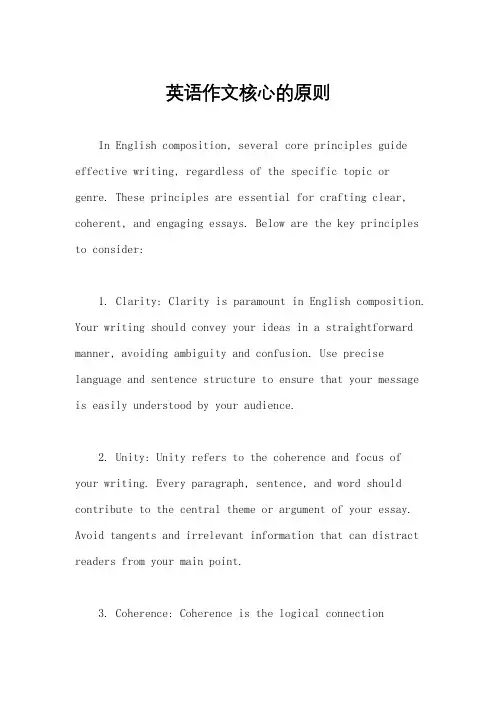
英语作文核心的原则In English composition, several core principles guide effective writing, regardless of the specific topic or genre. These principles are essential for crafting clear, coherent, and engaging essays. Below are the key principles to consider:1. Clarity: Clarity is paramount in English composition. Your writing should convey your ideas in a straightforward manner, avoiding ambiguity and confusion. Use precise language and sentence structure to ensure that your message is easily understood by your audience.2. Unity: Unity refers to the coherence and focus of your writing. Every paragraph, sentence, and word should contribute to the central theme or argument of your essay. Avoid tangents and irrelevant information that can distract readers from your main point.3. Coherence: Coherence is the logical connectionbetween ideas in your writing. Use transitional words and phrases to guide readers smoothly from one point to the next. Additionally, ensure that your paragraphs are well-organized, with each sentence building upon the previous one.4. Conciseness: Conciseness involves expressing your ideas clearly and succinctly, without unnecessaryrepetition or wordiness. Trim any extraneous words or phrases that do not add value to your writing. Be mindful of your word choice and strive for precision and brevity.5. Variety: Variety adds richness and interest to your writing. Vary your sentence structure, length, and rhythm to keep readers engaged. Incorporate a mix of simple, compound, and complex sentences, as well as different types of punctuation and rhetorical devices.6. Accuracy: Accuracy is essential for maintaining credibility in your writing. Verify the accuracy of any facts, statistics, or quotations you include in your essay. Double-check spelling, grammar, and punctuation to ensurethat your writing is error-free.7. Originality: Originality involves expressing your unique perspective and voice in your writing. Avoidclichés and generic language, and strive to offer fresh insights and interpretations. Incorporate your own ideas and experiences to make your writing more compelling and authentic.8. Audience Awareness: Consider your audience's needs, interests, and expectations when writing. Adapt your tone, style, and level of formality to suit your audience, whether it's a general readership, academic peers, or a specific professional group.9. Revision and Proofreading: Revision and proofreading are crucial steps in the writing process. Take the time to review and refine your essay, focusing on clarity, coherence, and effectiveness. Look for areas where you can improve clarity, strengthen arguments, or polish language.By adhering to these core principles, you can enhancethe quality and impact of your English composition, creating essays that are clear, coherent, and engaging to readers.。
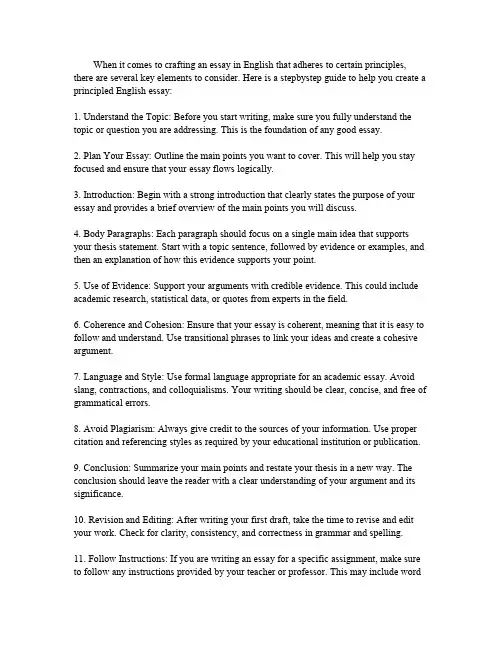
When it comes to crafting an essay in English that adheres to certain principles, there are several key elements to consider.Here is a stepbystep guide to help you create a principled English essay:1.Understand the Topic:Before you start writing,make sure you fully understand the topic or question you are addressing.This is the foundation of any good essay.2.Plan Your Essay:Outline the main points you want to cover.This will help you stay focused and ensure that your essay flows logically.3.Introduction:Begin with a strong introduction that clearly states the purpose of your essay and provides a brief overview of the main points you will discuss.4.Body Paragraphs:Each paragraph should focus on a single main idea that supports your thesis statement.Start with a topic sentence,followed by evidence or examples,and then an explanation of how this evidence supports your point.e of Evidence:Support your arguments with credible evidence.This could include academic research,statistical data,or quotes from experts in the field.6.Coherence and Cohesion:Ensure that your essay is coherent,meaning that it is easy to follow and e transitional phrases to link your ideas and create a cohesive argument.nguage and Style:Use formal language appropriate for an academic essay.Avoid slang,contractions,and colloquialisms.Your writing should be clear,concise,and free of grammatical errors.8.Avoid Plagiarism:Always give credit to the sources of your e proper citation and referencing styles as required by your educational institution or publication.9.Conclusion:Summarize your main points and restate your thesis in a new way.The conclusion should leave the reader with a clear understanding of your argument and its significance.10.Revision and Editing:After writing your first draft,take the time to revise and edit your work.Check for clarity,consistency,and correctness in grammar and spelling.11.Follow Instructions:If you are writing an essay for a specific assignment,make sure to follow any instructions provided by your teacher or professor.This may include wordcount,formatting,or specific points to address.12.Reflect on Principles:Throughout the writing process,reflect on the principles that guide your work.This could include principles of academic integrity,critical thinking,or ethical considerations.By following these steps,you can create an English essay that is wellstructured, persuasive,and adheres to the principles of good academic writing.。

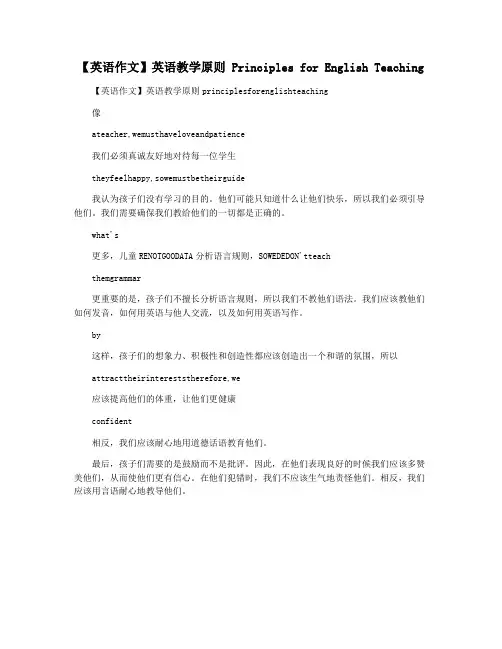
【英语作文】英语教学原则 Principles for English Teaching 【英语作文】英语教学原则principlesforenglishteaching
像
ateacher,wemusthaveloveandpatience
我们必须真诚友好地对待每一位学生
theyfeelhappy,sowemustbetheirguide
我认为孩子们没有学习的目的。
他们可能只知道什么让他们快乐,所以我们必须引导他们。
我们需要确保我们教给他们的一切都是正确的。
what's
更多,儿童RENOTGOODATA分析语言规则,SOWEDEDON'tteach
themgrammar
更重要的是,孩子们不擅长分析语言规则,所以我们不教他们语法。
我们应该教他们如何发音,如何用英语与他人交流,以及如何用英语写作。
by
这样,孩子们的想象力、积极性和创造性都应该创造出一个和谐的氛围,所以
attracttheirintereststherefore,we
应该提高他们的体重,让他们更健康
confident
相反,我们应该耐心地用道德话语教育他们。
最后,孩子们需要的是鼓励而不是批评。
因此,在他们表现良好的时候我们应该多赞美他们,从而使他们更有信心。
在他们犯错时,我们不应该生气地责怪他们。
相反,我们应该用言语耐心地教导他们。

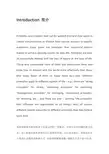
Introduction 简介Principles are concepts that can be applied over and over again in similar circumstances as distinct from narrow answers to specific questions. Every game has principles that successful players master to achieve winning results. So does life. Principles are ways of successfully dealing with the laws of nature or the laws of life. Those who understand more of them and understand them well know how to interact with the world more effectively than those who know fewer of them or know them less well. Different principles apply to different aspects of life - e.g., there are "skiing principles" for skiing, "parenting principles" for parenting, "management principles" for managing, “investment principles” for investing, etc - and there are over - arching "life principles" that influence our approaches to all things. And, of course, different people subscribe to different principles that they believe work best.原则是能够在相似场景下反复运用的一套概念,有别于具体问题的狭义回答。
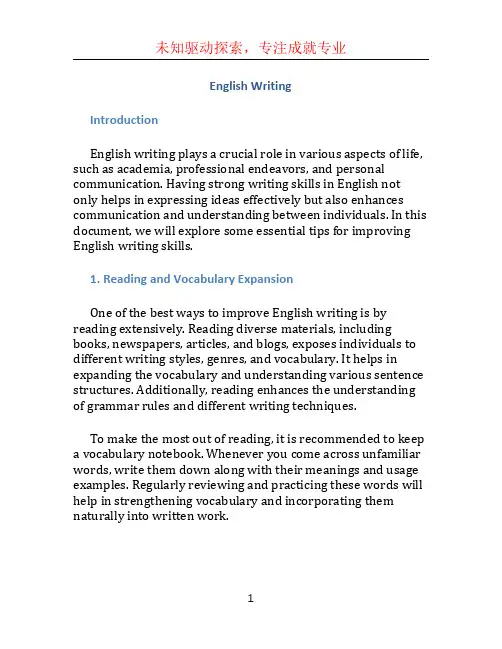
English WritingIntroductionEnglish writing plays a crucial role in various aspects of life, such as academia, professional endeavors, and personal communication. Having strong writing skills in English not only helps in expressing ideas effectively but also enhances communication and understanding between individuals. In this document, we will explore some essential tips for improving English writing skills.1. Reading and Vocabulary ExpansionOne of the best ways to improve English writing is by reading extensively. Reading diverse materials, including books, newspapers, articles, and blogs, exposes individuals to different writing styles, genres, and vocabulary. It helps in expanding the vocabulary and understanding various sentence structures. Additionally, reading enhances the understanding of grammar rules and different writing techniques.To make the most out of reading, it is recommended to keep a vocabulary notebook. Whenever you come across unfamiliar words, write them down along with their meanings and usage examples. Regularly reviewing and practicing these words will help in strengthening vocabulary and incorporating them naturally into written work.2. Grammar and Sentence StructureUnderstanding grammar rules is of utmost importance in English writing. A strong command of grammar ensures that ideas are conveyed clearly. Grammatical errors can lead to miscommunication and confusion for readers. Therefore, individuals should invest time in learning and practicing grammar rules.Additionally, focusing on sentence structure is essential for effective English writing. Sentences should be clear, concise, and well-structured. To achieve this, individuals should pay attention to subject-verb agreement, proper punctuation, and the use of appropriate connectors to create coherent and cohesive paragraphs.3. Practice Writing RegularlyPractice makes perfect, and this adage holds true for English writing as well. Regularly writing in English is crucial for honing writing skills. Set aside dedicated time each day or week to write on various topics. This practice will help in gaining confidence and becoming more comfortable with expressing ideas in written form.Furthermore, seeking feedback from experienced English speakers or language tutors can provide valuable insights into areas that require improvement. Constructive criticism can help in identifying weaknesses and provide specific guidance for enhancement.4. Use Online Writing ResourcesThe internet provides a vast array of resources that can aid in the improvement of English writing skills. Online writing resources, such as grammar checkers, style guides, writing forums, and writing courses, can be immensely helpful. These resources offer guidance, examples, and exercises to practice different aspects of writing. Utilizing them can enhance writing proficiency.5. Revise and EditEffective writing involves careful revision and editing. After completing a piece of writing, it is crucial to review it with a critical eye. Look for grammatical errors, clarity of ideas, logical flow, and overall coherence. Make necessary revisions to improve the quality of the writing.Proofreading is another essential step. Pay attention to spelling, punctuation, and formatting errors. Reading the text aloud can help in identifying awkward phrasing or sentences that don’t flow smoothly. Taking the time to revise and edit ensures that the final product is polished and error-free.ConclusionImproving English writing skills requires consistent effort, practice, and continuous learning. By incorporating the tips mentioned above, individuals can enhance their abilities and become proficient English writers. Remember to read widely, focus on grammar and sentence structure, practice writing regularly, utilize online resources, and revise and editdiligently. With dedication and perseverance, anyone can master the art of English writing.。
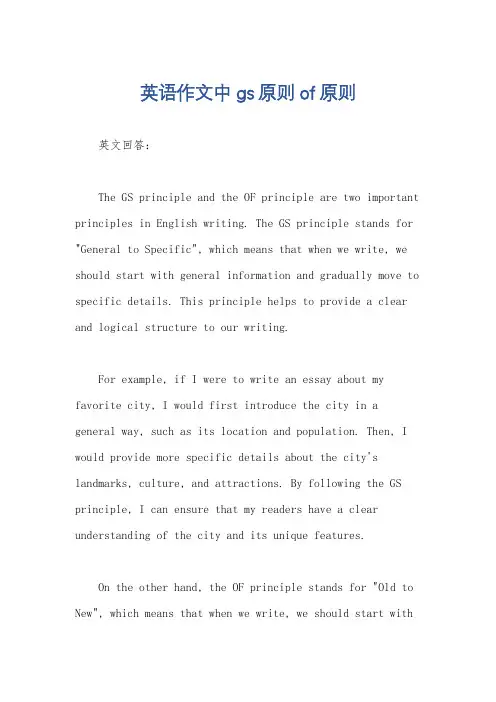
英语作文中gs原则of原则英文回答:The GS principle and the OF principle are two important principles in English writing. The GS principle stands for "General to Specific", which means that when we write, we should start with general information and gradually move to specific details. This principle helps to provide a clear and logical structure to our writing.For example, if I were to write an essay about my favorite city, I would first introduce the city in a general way, such as its location and population. Then, I would provide more specific details about the city's landmarks, culture, and attractions. By following the GS principle, I can ensure that my readers have a clear understanding of the city and its unique features.On the other hand, the OF principle stands for "Old to New", which means that when we write, we should start withinformation that is already known to the reader and then introduce new information. This principle helps toestablish a connection between the reader's existing knowledge and the new information being presented.For instance, if I were writing an essay about climate change, I would first mention the widely acceptedscientific consensus on the topic. Then, I would introduce new information about the causes and effects of climate change. By following the OF principle, I can ensure that my readers can easily grasp the new information and understand its significance in relation to what they already know.中文回答:GS原则和OF原则是英语写作中的两个重要原则。
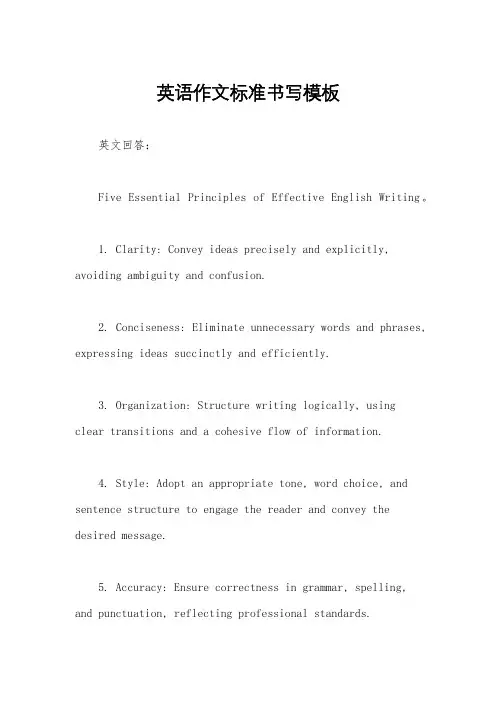
英语作文标准书写模板英文回答:Five Essential Principles of Effective English Writing。
1. Clarity: Convey ideas precisely and explicitly, avoiding ambiguity and confusion.2. Conciseness: Eliminate unnecessary words and phrases, expressing ideas succinctly and efficiently.3. Organization: Structure writing logically, usingclear transitions and a cohesive flow of information.4. Style: Adopt an appropriate tone, word choice, and sentence structure to engage the reader and convey the desired message.5. Accuracy: Ensure correctness in grammar, spelling, and punctuation, reflecting professional standards.Seven Common Errors in English Writing。
1. Subject-verb agreement: The verb must agree in number and person with its subject.2. Pronoun reference: Pronouns must clearly refer to specific nouns or noun phrases.3. Verb tense consistency: Use verbs in the correct tense to maintain logical flow and clarity.4. Comma splices and run-on sentences: Separate independent clauses with a period, semicolon, or comma.5. Misplaced modifiers: Position modifiers close to the words they modify to avoid confusion.6. Dangling modifiers: Participles and infinitives must have clear subjects to avoid grammatical errors.7. Redundancy: Avoid using unnecessary or repetitivewords and phrases that weaken writing.Techniques for Improving English Writing Skills。
英语基本原理The basic principles of English can be summed up by the following key points:1. Grammar: English grammar follows a set of rules that govern the structure and formation of sentences. This includes the proper use of tenses, subject-verb agreement, and word order.2. Vocabulary: English has a wide range of vocabulary, with words borrowed from various languages and cultures. It is important to have a good command of vocabulary in order to communicate effectively.3. Pronunciation: English pronunciation can be tricky, as there are many words that are spelled similarly but pronounced differently. It is important to practice and learn the correct pronunciation of words.4. Writing: English writing follows certain conventions in terms of punctuation, spelling, and sentence structure. It is important to be able to write clearly and coherently in English.5. Reading: Reading is an important aspect of language learning, as it helps to improve vocabulary, grammar, and comprehension skills. It is important to read a wide variety of texts in English in order to become proficient in the language.6. Listening and speaking: English language learners need to practice their listening and speaking skills in order to become fluent. This involves being able to understand spoken English and communicate effectively in conversations.中文翻译:英语的基本原理可以归纳为以下几个关键点:1. 语法:英语语法遵循一套规则,规定了句子的结构和形成。
英语作文10个原则怎么写Title: Ten Principles of Writing in English。
Writing in English is a skill that requires practice, patience, and adherence to certain principles. Whether you are writing an essay, a story, or a report, following these ten principles can help you communicate effectively and engage your readers. Let's delve into each principle:1. Clarity: The foremost principle of writing isclarity. Your writing should be clear and easy to understand. Use simple language and avoid unnecessaryjargon or complexity.2. Conciseness: Be concise in your writing. Say whatyou need to say without unnecessary repetition or verbosity. Each word should contribute to the overall meaning of your piece.3. Coherence: Ensure that your writing flows smoothlyfrom one idea to the next. Use transitional words and phrases to connect sentences and paragraphs, guiding your readers through your thoughts seamlessly.4. Consistency: Maintain consistency in your writing style, tone, and formatting. This includes consistency in tense, point of view, and use of abbreviations or acronyms.5. Correctness: Pay attention to grammar, punctuation, and spelling. Incorrect usage can detract from your message and undermine your credibility as a writer. Proofread your work carefully before publishing or submitting.6. Originality: Strive for originality in your ideas and expression. While it's acceptable to draw inspiration from existing works, avoid plagiarism and ensure that your writing reflects your own unique perspective.7. Engagement: Aim to engage your readers from the outset. Use compelling hooks, vivid descriptions, and thought-provoking questions to capture their interest and keep them invested in your writing.8. Relevance: Keep your writing relevant to your intended audience and purpose. Tailor your content to address their interests, concerns, and level of understanding.9. Precision: Choose your words carefully to convey your intended meaning accurately. Avoid ambiguity or vague language that could lead to misinterpretation.10. Revision: Finally, revise and refine your writing as needed. Editing is an essential part of the writing process, allowing you to polish your work and make it as effective as possible.By adhering to these ten principles, you can improve your writing skills and communicate more effectively in English. Remember to practice regularly and seek feedback from others to further enhance your abilities. Happy writing!。
有什么原则和技巧英语作文Principles and Techniques for Writing in English。
Writing in English can be a challenging task for many people, especially those who are not native speakers. However, there are some principles and techniques that can help you improve your writing skills and produce high-quality texts. In this article, we will discuss some of these principles and techniques.Principles for Writing in English。
1. Clarity: The first principle of writing in English is clarity. Your writing should be clear and easy to understand. Avoid using complex sentences and technical jargon that may confuse your readers.2. Conciseness: The second principle is conciseness. Your writing should be concise and to the point. Avoid using unnecessary words and phrases that may make yourwriting long and tedious.3. Coherence: The third principle is coherence. Your writing should be well-organized and easy to follow. Use transitional words and phrases to connect your ideas and make your writing flow smoothly.4. Correctness: The fourth principle is correctness. Your writing should be grammatically correct and free of spelling and punctuation errors. Use a spell checker and proofread your writing carefully before submitting it.Techniques for Writing in English。
Title: English Writing Principles Illustrated with ExamplesIn English writing, there are several key principles to keep in mind to create engaging and effective content. Let's explore these principles through the eyes of a child, with examples to illustrate each concept.1. Clarity:When writing in English, it's essential to be clear and concise. Use simple language that everyone can understand. For example, instead of saying, "The extravagant monarch resided in the opulent palace," a clearer version would be, "The king lived in a fancy castle."2. Creativity:English writing allows for creativity and imagination to flourish. Let your ideas soar and paint vivid pictures with your words. For instance, instead of saying, "The cat ran quickly," you could say, "The cat sprinted like lightning."3. Consistency:Consistency is key in English writing to maintain coherence throughout your piece. Stick to a consistent tone, style, andtense. For example, if you're writing a story in the past tense, avoid switching to the present tense midway through.4. Conciseness:In English writing, brevity is often appreciated. Cut out unnecessary words and phrases to keep your writing clear and to the point. For instance, instead of saying, "At this point in time," you could simply say, "Now."5. Connection:Create connections between your ideas to guide your reader through your writing smoothly. Use transitional words and phrases to link sentences and paragraphs logically. For example, instead of abruptly shifting topics, you could use phrases like "In addition" or "Furthermore" to smoothly transition between ideas.6. Correctness:Ensure your English writing is grammatically correct and free of spelling errors. Proofread your work carefully or use grammar-checking tools to catch any mistakes. For instance, instead of saying, "He don't like carrots," the correct version would be, "He doesn't like carrots."7. Captivation:Capture your reader's attention from the beginning and keep them engaged throughout your writing. Use descriptive language and compelling storytelling to draw them into your world. For example, instead of saying, "It was a sunny day," you could say, "The sun bathed the world in golden warmth, inviting everyone to bask in its glow."By following these principles of English writing, you can craft captivating and impactful content that resonates with your audience. Remember to practice regularly and experiment with different styles to find your unique voice as a writer. Happy writing!。
英语作文看到的变化怎么写题目,The Changes I've Seen Through English Composition。
Throughout my journey of learning English composition,I've witnessed a myriad of transformations both within myself and in the world around me. From the initialstruggles to grasp basic grammar rules to the profound insights gained through literature, every step of this voyage has been marked by evolution and growth. In this essay, I will delve into the significant changes I've observed, both personally and globally, through the lens of English composition.First and foremost, my proficiency in English has undergone a remarkable transformation. When I embarked on this journey, I grappled with the fundamentals of grammar and syntax. However, through relentless practice and dedication, I have conquered these initial hurdles and honed my language skills to a commendable level. I nowwield English as a powerful tool for communication,effortlessly expressing my thoughts and ideas with clarity and precision.Moreover, delving into the world of English literature has broadened my horizons and enriched my understanding of humanity. Through the timeless works of Shakespeare, Dickens, and Austen, I have traversed different epochs and cultures, gaining profound insights into the complexitiesof the human condition. Each literary masterpiece has left an indelible imprint on my soul, fostering empathy, compassion, and a deeper appreciation for the diversity of human experiences.In addition to personal growth, the landscape ofEnglish composition has undergone significant changes on a global scale. With the advent of technology and the proliferation of the internet, the way we communicate and consume information has undergone a paradigm shift. Social media platforms have emerged as powerful mediums for expression, allowing individuals to share their stories and connect with others across geographical boundaries. However, this digital revolution has also ushered in new challenges,such as the proliferation of misinformation and the erosion of traditional writing conventions.Furthermore, the role of English as a global language has become increasingly prominent in today's interconnected world. As businesses expand across borders and cultures collide, proficiency in English has become a valuable asset in the global marketplace. Whether it's sealing international deals or fostering cross-cultural understanding, the ability to communicate effectively in English has become indispensable in a variety of professional and personal contexts.However, amidst these transformations, certain timeless principles of English composition remain immutable. The importance of clarity, coherence, and conciseness inwriting transcends time and technological advancements. Whether crafting a persuasive argument or spinning a captivating narrative, the art of effective communication hinges on these fundamental principles. As such, while the tools and mediums of expression may evolve, the essence of good writing endures through the ages.In conclusion, my journey through English composition has been characterized by profound transformations, both personally and globally. From mastering the intricacies of grammar to delving into the depths of literature, every step of this voyage has shaped me into a more articulate and empathetic individual. Moreover, as the world undergoes rapid changes fueled by technology and globalization, the role of English as a global language has becomeincreasingly prominent. Yet, amidst these shifts, the timeless principles of effective communication remain steadfast, serving as guiding beacons in a rapidly changing world. As I continue on this journey, I am eager to embrace the challenges and opportunities that lie ahead, confident in the transformative power of language to shape minds and bridge cultures.。
英语作文不很好吃Certainly, I can help you with that. Here's a sample English essay:---。
Improving English Writing Skills。
Writing in English can be challenging for many individuals, but with dedication and practice, significant improvement is possible. In this essay, we will explore various strategies to enhance English writing skills.First and foremost, reading extensively in English is crucial. Reading exposes us to diverse vocabulary, sentence structures, and writing styles. It helps in familiarizing oneself with the language's nuances and conventions. Additionally, it provides inspiration and ideas for our own writing. Therefore, developing a habit of reading English literature, newspapers, magazines, or online articles cangreatly benefit one's writing skills.Moreover, writing regularly is essential for improvement. Practice makes perfect, and the same appliesto writing. Setting aside time each day to write, whetherit's journaling, composing essays, or even maintaining a blog, helps in honing writing abilities. It allows us to experiment with different writing techniques, receive feedback, and identify areas for improvement. Consistencyin writing is key to progress.Furthermore, seeking feedback from others is invaluable. Constructive criticism from peers, teachers, or online communities can provide valuable insights into our writing strengths and weaknesses. It helps in identifying recurring errors, improving clarity, and refining our writing style. Embracing feedback with an open mind fosters continuous growth as a writer.Another effective strategy is to study grammar and syntax rules. Understanding the fundamental principles of English grammar enhances our ability to communicateeffectively through writing. There are numerous resources available, such as grammar books, online courses, and grammar-checking tools, that can aid in learning and practicing grammar rules.Additionally, expanding one's vocabulary is beneficial. Using a diverse range of words adds depth and richness to our writing. Regularly learning new words and their meanings, as well as synonyms and antonyms, broadens our linguistic repertoire. Utilizing vocabulary-building techniques, such as flashcards, word games, orincorporating new words into writing exercises, can facilitate vocabulary acquisition.Furthermore, paying attention to sentence structure and organization is crucial. Well-structured sentences and coherent paragraphs enhance readability and comprehension. Employing techniques such as varied sentence lengths, transitional phrases, and logical flow of ideas contributes to the overall effectiveness of our writing.In conclusion, improving English writing skillsrequires dedication, practice, and a willingness to learn. By reading extensively, writing regularly, seeking feedback, studying grammar, expanding vocabulary, and focusing on sentence structure and organization, one can significantly enhance their proficiency in English writing. Remember, Rome wasn't built in a day, but with perseverance and determination, mastery of English writing is achievable.---。